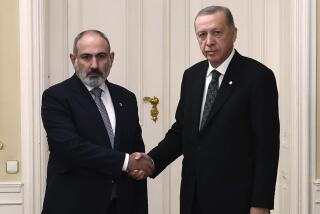Armenians’ Forum Demands Recognition of Genocide
- Share via
Members of Los Angeles-area Armenian groups met at UCLA on Saturday for a conference that organizers described as a step toward legal action aimed at forcing the government of Turkey to acknowledge genocide against Armenians during World War I.
Bitterness over the events of 70 years ago and Turkey’s continuing denial of many widely accepted facts concerning the expulsion of Armenians from their homeland has led Armenian terrorists to launch attacks against Turkish diplomats in many parts of the world over the last 12 years. Conference participants were seeking another path.
Alternative Action
“There are many in the Armenian community who believe that this question is subject to legal remedies--not just the political remedies and violent remedies that have been pursued by others,” moderator Walter Karabian, a Los Angeles attorney and former state assemblyman, said Saturday. “Our attempt is to give to this community all the possible alternatives and courses of action to try to resolve this question.”
The Turkish Ottoman Empire, which sided with Germany in World War I, accused the Armenians of eastern Turkey of sympathizing with Russia, its wartime enemy. As a horrified world looked on, the Armenians were massacred in their villages or marched into the Syrian desert to face starvation. An estimated 1.5 million people--half the Armenian population of the world at the time--perished between 1915 and 1917.
Turkish governments have defended the actions of Ottoman officials, claiming that the deportations were a wartime necessity and that the number of deaths has been exaggerated.
Speakers at the conference, which drew an audience of about 230, discussed the background of the 20th Century’s first instance of genocide and outlined three arenas for possible action: U.S. courts, the World Court in The Hague or informal “people’s tribunals.”
Plea for Restitution
“We believe the Turkish government has to acknowledge the events that took place in 1915,” Karabian said. “We think there should be some form of restitution, not at all unlike that which was done by the German government (on behalf of Jewish victims of the Holocaust) after World War II. . . . I suspect that this symposium will provoke leaders in the Armenian community to begin to think about legal remedies. That means who their lawyers should be, where the issue should be tried, how to raise the money for such an effort, who should direct the effort.”
Michael J. Bazyler, associate professor at Whittier College School of Law in Los Angeles, outlined case precedents that would apply to lawsuits in U.S. courts seeking restitution from either the government of Turkey or individuals involved in the killings, should any still be alive and in the United States.
Anthony D’Amato, a professor of political science and international law at Northwestern University School of Law in Chicago, suggested that Armenian organizations draft a formal complaint to be presented to the World Court seeking redress from Turkey, then search for a sympathetic government to file it.
The precedent of the Paris-based Permanent People’s Tribunal--an outgrowth of the Bertrand Russell Tribunal that investigated U.S. involvement in Vietnam and has since examined the Soviet invasion of Afghanistan and the Armenian genocide--was cited by Richard A. Falk, a Princeton University professor of International Law, who urged that similar panels be formed in the United States and other countries to promote knowledge of the genocide.
More to Read
Sign up for Essential California
The most important California stories and recommendations in your inbox every morning.
You may occasionally receive promotional content from the Los Angeles Times.













